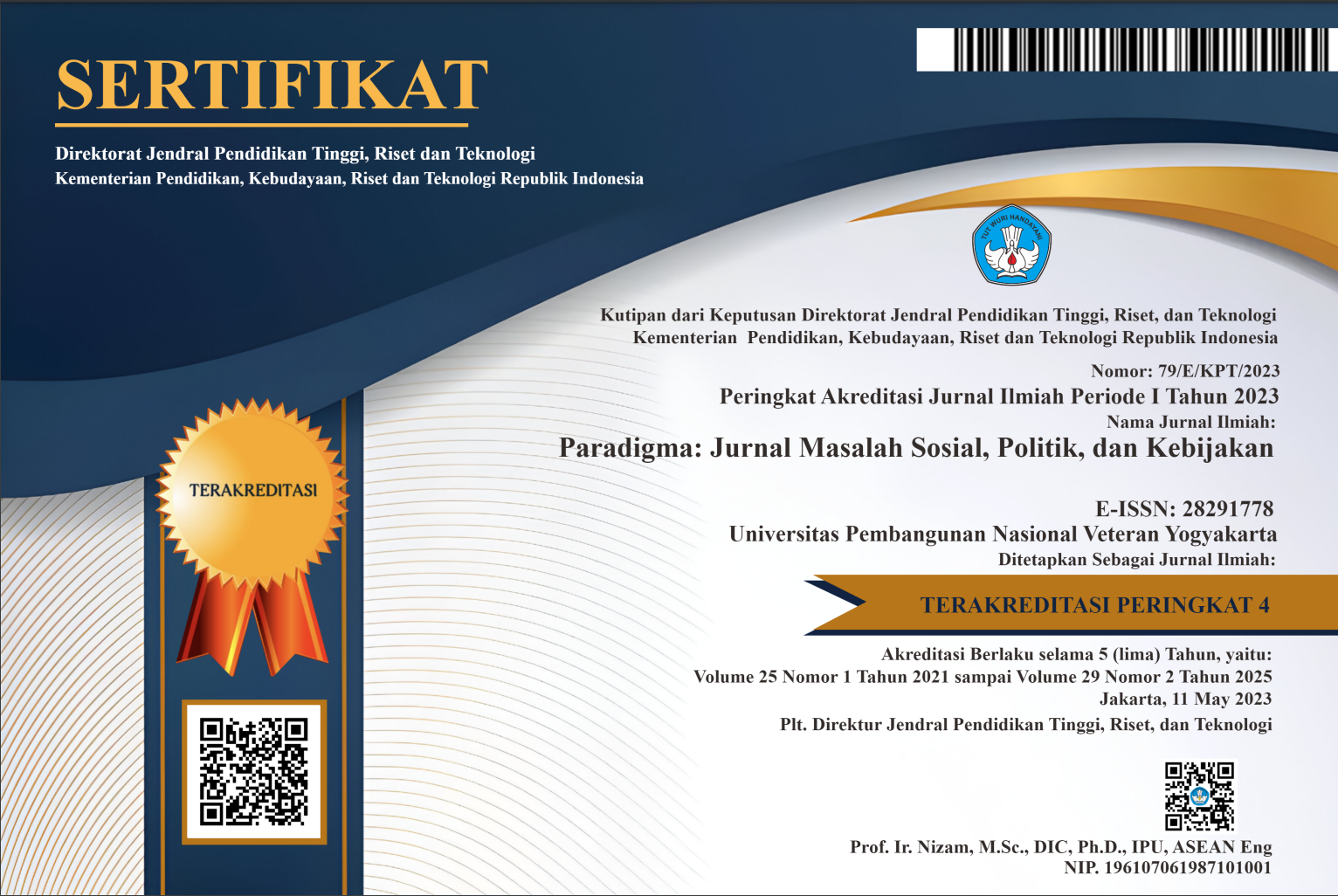KINERJA BIROKRASI PADA SITUASI KRISIS SEBAGAI REFLEKSI MENGUKUR REFORMASI BIROKRASI DI INDONESIA
Abstract
The performance of the bureaucracy in Indonesia faces a big challenge when the Covid-19 pandemic situation occurs. As the spearhead of a policy issued by the government, the bureaucracy is expected to be run effectively and efficiently. Especially in a crisis situation, the resulting impact must be immediately felt by the affected community. It is interesting because the character of bureaucracy is always associated with slow motion, rigidity, and quite complicated. In fact, in a crisis situation like this, a bureaucratic character that is coordinated, adaptive to field needs, and measurable in every step taken is needed. This aim paper to reflect on the Reform Agenda in Indonesia which has been launched in recent years with the performance of the bureaucracy in responding to the crisis due to the Covid-19 pandemic outbreak. The research method is carried out qualitatively and data collection through secondary data collection. The result this research for reflection that is carried out tries to provide recommendations view on the current bureaucratic reform agenda in Indonesia using the concepts of Bureaucratic Reform Politics and Strong Political Leadership. These two concepts are relevant to explain the shortcomings of the bureaucratic changes that have been planned so far.
Keywords
Full Text:
PDF (Bahasa Indonesia)References
Blau, P. M. (1987). Birokrasi dalam Masyarakat Modern. Jakarta: UI Press.
Carino, L. V. (1994). Bureauuary for Democracy, The Dynamics of Exexutive Bureaucracy Interaction During Governmental Transitions. College of Publik Administration, University of th Philippines.
Dwiyanto, A. (2008). Reformasi Birokrasi Publik. Yogyakarta: UGM Press.
Edinger, L. J. (1993). A Preface to Studies in Political Leadership', in G.Sheffer (Ed.). New York: Albany State University of New York Press.
Geertz, C. (1983). Abangan, Santri, Priyayi dalam Masyarakat Jawa. Jakarta: Pustaka Jaya.
Green, R. T., & Hubell, L. (1996). On Governance and Reinventing Government. Sage Publications.
Margono, S. A. (1998). Birokrasi, Demokrasi, dan Reformasi: Sudut Pandang Administrasi Negara. Jurnal Sosial Politik Vol.2, No.2, 47-66.
Okhtariza, N. (30 Maret 2020). Perkuat Mandat BNPB dan Pertajam Komunikasi Penanganan Covid-19, CSIS Commentaries. pp. 1-4.
Thoha, M. (2000). Reformasi Birokrasi Publik Pasca Orde Baru: Perubahan tanpa Grand Design. Jurnal Ilmu Sosial dan Ilmu Politik, 70-91.
Uveges, J. A. (1982). Public Administration, History and Theory in Contemporary Perspective. New Jersey: Marcel Dekker, Inc.
Vermonte, P. (9 April 2020). Karakteristik dan Persebaran Covid-19 di Indonesia: Temuan Awal, CSIS Commentaries. pp. 1-12.
Widaningrum, A., & Mas`udi, W. (2020). Dinamika Respon Pemerintah Nasional: Krisis Kebijakan Penanganan Covid-19. In W. Mas`udi, & P. S.Winanti, Tata Kelola Penanganan COVID-19 di Indonesia: Kajian Awal (pp. 46-63). Yogyakarta: Gadjah Mada University Press.
https://nasional.tempo.co/read/1343648/potensi-potensi-penyimpangan-penanganan-wabah-covid-19-kata-icw/full&view=ok
DOI: https://doi.org/10.31315/paradigma.v25i2.5329
Refbacks
- There are currently no refbacks.
Copyright (c) 2021 Halim Dwi Putra, Syahran Firdaus, Catur Susanto

This work is licensed under a Creative Commons Attribution-NonCommercial-ShareAlike 4.0 International License.
Paradigma: Jurnal Masalah Sosial, Politik, dan Kebijakan
Published by Faculty of Social Science and Political Science
Universitas Pembangunan Nasional "Veteran" Yogyakarta
(Kampus Unit II) Jl. Babarsari 2, Tambakbayan, Depok, Yogyakarta 55281
Phone: +62 274 486733. Email: paradigma@upnyk.ac.id

This work is licensed under a Creative Commons Attribution-ShareAlike 4.0 International License.


